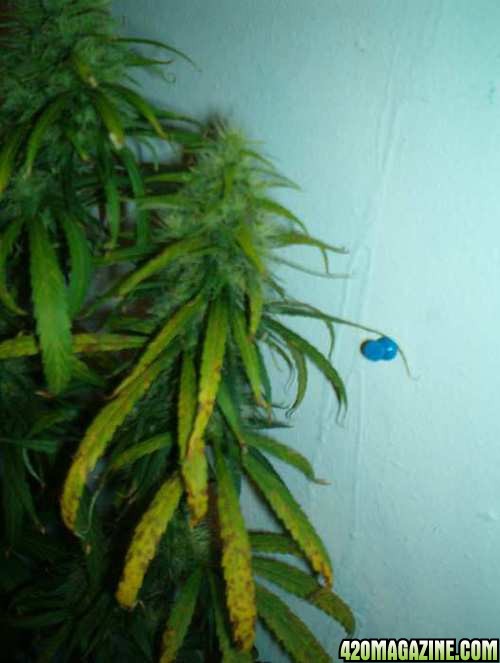hey herb this may help you with finding out what is wrong its a useful thing to keep to hand i think ....Quote:
Key on Nutrient Disorders
To use the Problem-Solver, simply start at #1 below. When you think you've found the problem, read the Nutrients section to learn more about it. Diagnose carefully before making major changes.
1) a) If the problem affects only the bottom or middle of the plant go to #2.
b) If it affects only the top of the plant or the growing tips, skip to #10. If the problem seems to affect the entire plant equally, skip to #6.
2) a) Leaves are a uniform yellow or light green; leaves die & drop; growth is slow. Leaf margins are not curled-up noticeably. >> Nitrogen (N) deficiency.
b) If not, go to #3.
3) a) Margins of the leaves are turned up, and the tips may be twisted. Leaves are yellowing (and may turn brown), but the veins remain somewhat green. >> Magnesium (Mg) deficiency.
b) If not, go to #4.
4) a) Leaves are browning or yellowing. Yellow, brown, or necrotic (dead) patches, especially around the edges of the leaf, which may be curled. Plant may be too tall. >> Potassium (K) deficiency.
b) If not, keep reading…
5) a) Leaves are dark green or red/purple. Stems and petioles may have purple & red on them. Leaves may turn yellow or curl under. Leaf may drop easily. Growth may be slow and
leaves may be small. >> Phosphorous (P) deficiency.
b) If not, go to #6.
6) a) Tips of leaves are yellow, brown, or dead. Plant otherwise looks healthy & green. Stems may be soft >> Over-fertilization (especially N), over-watering, damaged roots, or
insufficient soil aeration (use more sand or perlite. Occasionally due to not enough N, P, or K.
b) If not, go to #7.
7) a) Leaves are curled under like a ram's horn, and are dark green, gray,
brown, or gold. >> Over-fertilization (too much N).
b) If not, go to #8…
8) a) The plant is wilted, even though the soil is moist. >>Over-fertilization, soggy soil, damaged roots, disease; copper deficiency (very unlikely).
b) If not, go to #9.
9) a) Plants won't flower, even though they get 12 hours of darkness for over 2 weeks. >> The night period is not completely dark. Too much nitrogen. Too much pruning or cloning.
b) If not, go to #10...
10) a) Leaves are yellow or white, but the veins are mostly green. >> Iron (Fe) deficiency.
b) If not, #11.
11) a) Leaves are light green or yellow beginning at the base, while the leaf
margins remain green. Necrotic spots may be between veins. Leaves are not twisted. >> Manganese (Mn) deficiency.
b) If not, #12.
12) a) Leaves are twisted. Otherwise, pretty much like #11. >> Zinc (Zn)
deficiency.
b) If not, #13.
13) a) Leaves twist, then turn brown or die. >> The lights are too close to the plant. Rarely, a Calcium (Ca) or Boron (B) deficiency.
b) If not… You may just have a weak plant.






